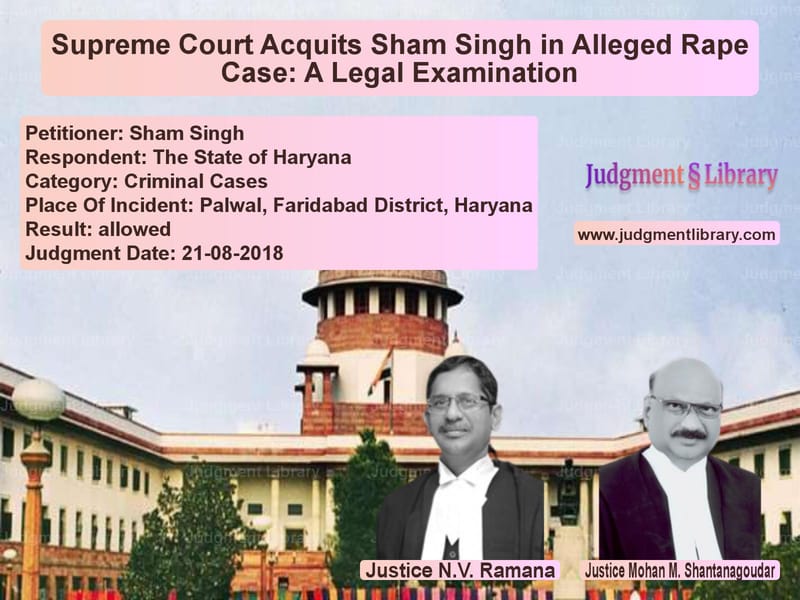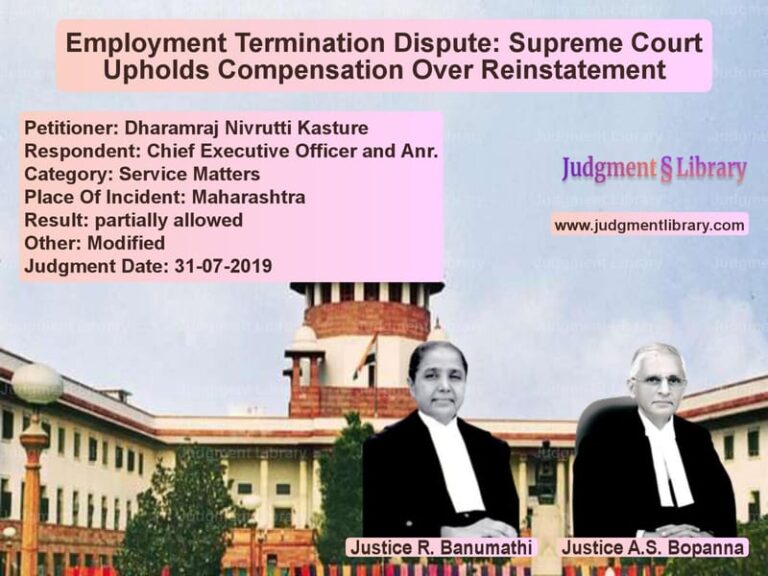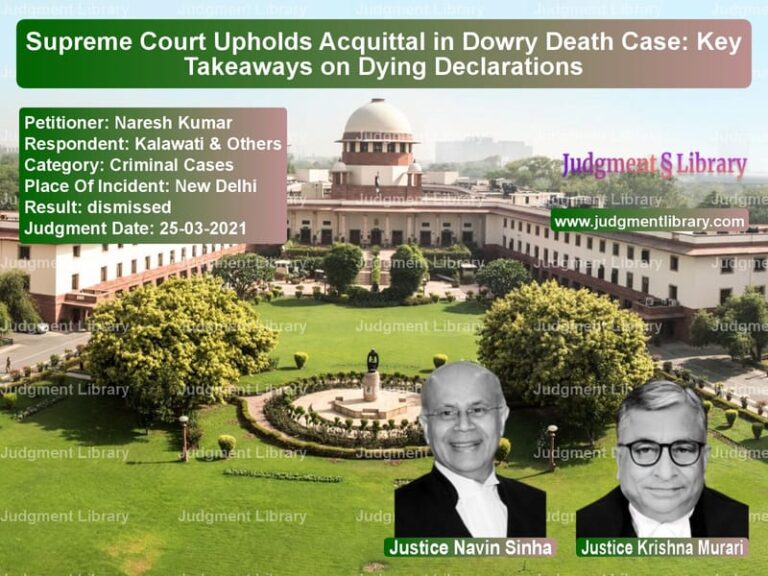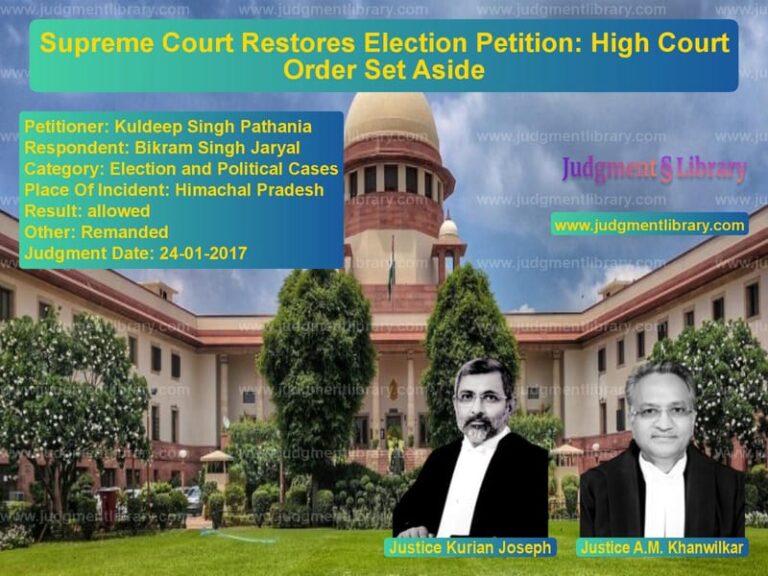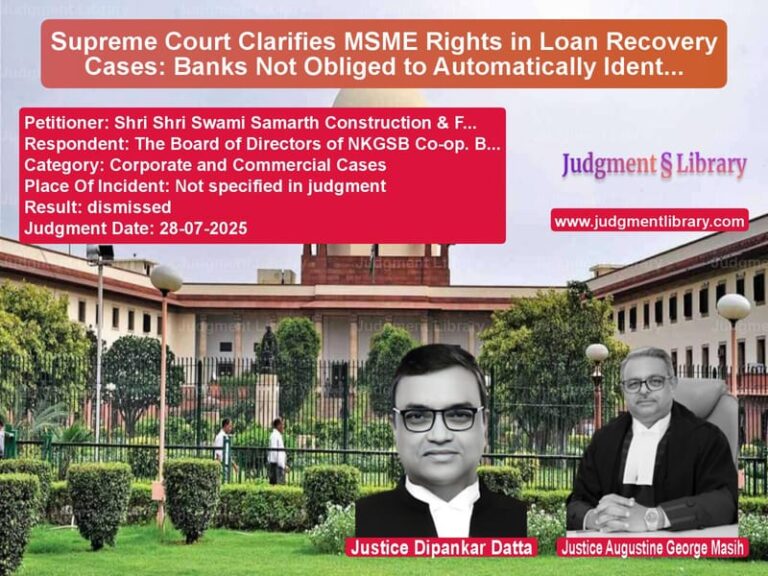Supreme Court Acquits Sham Singh in Alleged Rape Case: A Legal Examination
The Supreme Court of India recently overturned the conviction of Sham Singh, who had been serving a sentence for rape. This case, which originated in 2001, saw several turns in lower courts before reaching the Supreme Court. The judgment highlights critical legal principles, including the necessity of credible evidence, the role of medical reports, and the weight of witness testimonies. The decision reaffirms the importance of upholding justice through fair trials, ensuring that convictions are based on legally sound evidence rather than conjecture.
Background of the Case
The case involved an alleged rape incident on the night of August 22, 2001, in Palwal, Faridabad District, Haryana. The victim, a minor girl, was staying at the house of her paternal uncle and aunt. According to the prosecution, when she stepped outside to urinate, she was forcibly taken to a house by her cousins, Jai Singh and Sham Singh. It was alleged that they tied her hands to a cot and raped her. Furthermore, their mother allegedly threatened the victim and forced her to consume a substance that caused her to lose consciousness. The next morning, she was found unconscious by a milkman, Mahavir, who informed her aunt.
Initial Investigation and Trial
An FIR was registered at the City Police Station in Palwal under FIR No. 653 dated August 25, 2001. The case proceeded to trial in the Additional Sessions Court, Faridabad. The prosecution charged Jai Singh and Sham Singh under Sections 376(2)(g) (gang rape), 342 (wrongful confinement), and 506 (criminal intimidation) of the Indian Penal Code (IPC). Their mother, Memwati, was also charged under Sections 342 and 506 of the IPC.
The Trial Court initially acquitted the accused, citing insufficient evidence. However, the victim appealed the decision before the Punjab and Haryana High Court, which set aside the acquittal and ordered a fresh trial. Upon retrial, the accused were convicted, and both Jai Singh and Sham Singh were sentenced to ten years of imprisonment. The High Court, however, acquitted their mother, Memwati.
Appeal Before the Supreme Court
Sham Singh, who was still serving his sentence, appealed to the Supreme Court. His defense put forth several crucial arguments:
- The medical report did not conclusively establish rape. Dr. Rekha Singh, the examining medical officer, noted that while the victim’s hymen was torn, the tear was old, and no semen was found on the vaginal swab or clothing.
- The victim’s testimony contained inconsistencies. Initially, she did not mention a panchayat meeting where the accused allegedly confessed. However, months later, she introduced this claim, casting doubt on its authenticity.
- The prosecution failed to examine key witnesses, including Mahavir, the milkman who found the victim, and Pappu, in front of whose house she was discovered unconscious.
- The accused’s defense witnesses, including panchayat members, testified that the alleged confession was only about slapping the victim and not about rape.
- The location of the alleged crime, the accused’s home, was deemed improbable for such an act to occur unnoticed by family members.
Supreme Court’s Observations
The Supreme Court, while hearing the appeal, reiterated the principles laid down in previous rulings. It emphasized that while a victim’s testimony should generally be given weight, it must also be credible and consistent. In cases involving sexual offenses, the Court must be sensitive but should not disregard major inconsistencies in evidence.
The Court observed that in the case of State of Punjab v. Gurmit Singh (1996), it was held that minor contradictions should not derail an otherwise credible case. However, in Raju v. State of M.P. (2008), the Court cautioned that false allegations could cause irreparable damage to the accused, and convictions must be based on strong evidence.
Examination of Evidence
The Supreme Court thoroughly assessed the evidence and found several flaws in the prosecution’s case:
- The victim’s injury report did not confirm recent sexual assault.
- The prosecution did not examine independent witnesses who could have corroborated the allegations.
- The panchayat meeting, claimed by the victim in a delayed statement, was not substantiated with independent testimony.
- The defense witnesses remained consistent and unshaken during cross-examination.
Defense’s Argument
The defense argued that the case was fabricated due to family enmity. It was pointed out that Sham Singh and Jai Singh were relatives of the victim, and their families had disputes. The defense highlighted that the first accused, Jai Singh, had discovered love letters allegedly written by the victim to someone, which led to an altercation. The panchayat meeting was convened to address Jai Singh slapping the victim, not an alleged rape.
Supreme Court’s Ruling
After careful examination, the Supreme Court ruled in favor of Sham Singh. It found that the conviction was primarily based on conjecture and uncorroborated allegations. The judgment stated:
“We find that the Trial Court and the High Court have convicted the accused merely on conjectures and surmises. The Courts have come to the conclusion based on assumptions and not on legally acceptable evidence. Medical evidence does not support the case of the prosecution relating to the offense of rape.”
The Court further noted:
“The evidence of the victim and her aunt is unreliable, untrustworthy, and full of contradictions. The prosecution has tried to rope in the appellant merely on assumptions, surmises, and conjectures. The findings of the courts below, though concurrent, do not deserve acceptance due to glaring infirmities and illegalities.”
Conclusion
Based on these observations, the Supreme Court allowed the appeal, acquitted Sham Singh, and ordered his immediate release. The case serves as an important reminder of the necessity of sound legal evidence in criminal convictions. While the Court acknowledged the sensitivity of rape cases, it also reinforced the principle that an accused must not be convicted without credible evidence.
This judgment underscores the legal system’s responsibility to ensure that justice is served based on facts rather than emotions. It also highlights the importance of fair trials and due process, safeguarding both the rights of victims and the accused.
Petitioner Name: Sham Singh.Respondent Name: The State of Haryana.Judgment By: Justice N.V. Ramana, Justice Mohan M. Shantanagoudar.Place Of Incident: Palwal, Faridabad District, Haryana.Judgment Date: 21-08-2018.
Don’t miss out on the full details! Download the complete judgment in PDF format below and gain valuable insights instantly!
Download Judgment: Sham Singh vs The State of Haryana Supreme Court of India Judgment Dated 21-08-2018.pdf
Direct Downlaod Judgment: Direct downlaod this Judgment
See all petitions in Bail and Anticipatory Bail
See all petitions in Fraud and Forgery
See all petitions in Attempt to Murder Cases
See all petitions in Judgment by N.V. Ramana
See all petitions in Judgment by Mohan M. Shantanagoudar
See all petitions in allowed
See all petitions in supreme court of India judgments August 2018
See all petitions in 2018 judgments
See all posts in Criminal Cases Category
See all allowed petitions in Criminal Cases Category
See all Dismissed petitions in Criminal Cases Category
See all partially allowed petitions in Criminal Cases Category

